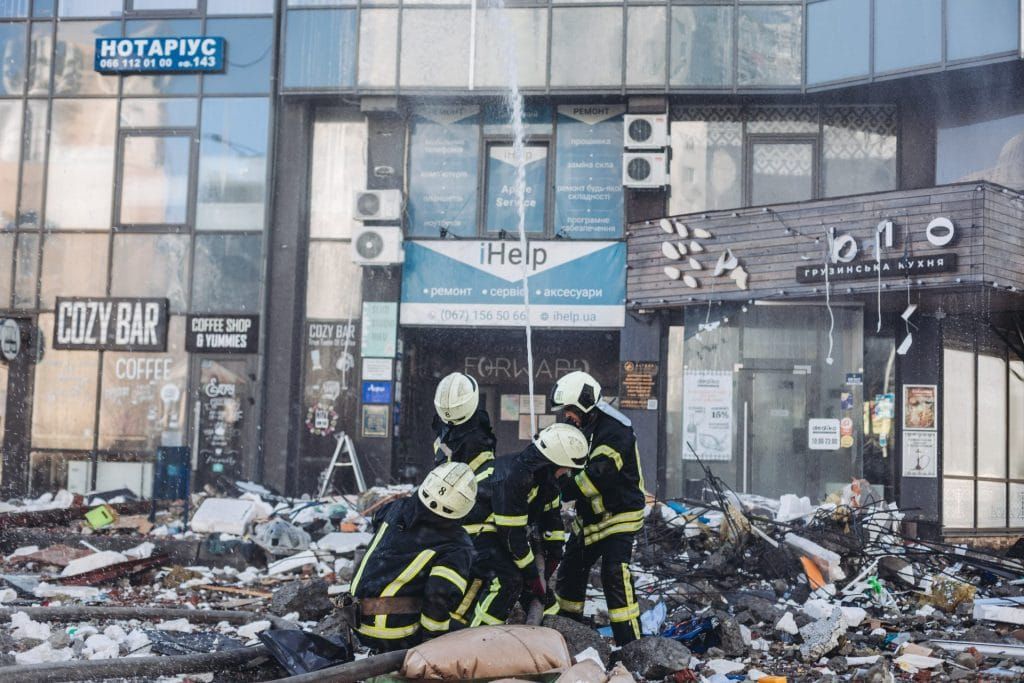Ukraine update: Ukrainian forces continue stiff resistance; Putin raises nuclear alert status; Ukrainian and Russian delegations to enter talks
By Susan D’Agostino | February 27, 2022
 Firefighters try to extinguish a fire from a bombed civilian building in a residential area on Saturday, in Kyiv, Ukraine. (Photo By Diego Herrera/Europa Press via Getty Images)
Firefighters try to extinguish a fire from a bombed civilian building in a residential area on Saturday, in Kyiv, Ukraine. (Photo By Diego Herrera/Europa Press via Getty Images)
Editor’s note: This is a developing story. For full Bulletin coverage of the Ukraine crisis, click here.
As Russia’s land, sea, and air war against Ukraine entered its fourth day, Ukrainian military and armed civilian forces continued to mount a strong resistance, with much of the globe rallying behind it. Still, President Vladimir Putin dialed up rhetoric this morning by saying that he was placing Russia’s nuclear forces on alert in response to “NATO aggression.” What his statement means in operational terms, however, is unclear as Russian (and US, for that matter) strategic nuclear missiles are generally to be on alert.
Still, the international community responded with fast condemnation, along with new sanctions against Russia.
In a television appearance Sunday, White House press secretary Jen Psaki said Putin’s order—which put his country’s nuclear forces on a “special regime of combat duty”—was yet another example of the Russian leader “manufacturing threats that don’t exist in order to justify further aggression.” In comments on CNN, NATO Secretary General Jens Stoltenberg called Putin’s nuclear alert order “dangerous rhetoric” and “a behaviour that is irresponsible.”
“We have not seen this level of nuclear saber rattling in Europe since the 1980s,” Hans Kristensen told the Bulletin today. Kristensen and Matt Korda—both of the Nuclear Information Project of the Federation of American Scientists—are the authors of Nuclear Notebook: How many nuclear weapons does Russia have in 2022?
Also on Sunday, President Zelensky agreed that a Ukrainian delegation would meet for talks with a Russian delegation “without preconditions” on the Ukrainian-Belarusian border. Russian culture minister Vladimir Medinsky, who will lead the Russian delegation, reported in his Telegram channel that Belarusian President Aleksandr Lukashenko, an ally of Putin, assured him that all planes, helicopters, and missiles stationed in Belarus would remain on the ground during the talks. With the date of the talks not yet announced, Iskander missiles were launched from Belarus into Ukraine today, according to a Facebook post by Ukraine’s interior minister, Anton Gerashchenko.
These developments were set against a backdrop of street fighting in Kharkiv, Ukraine’s second-largest city, and a new wave of Russian attacks on Ukrainian airfields and fuel facilities, prompting the government to warn of “environmental catastrophe.”
Since the beginning of the Russian invasion, much of the globe has rallied behind Ukraine. European Commission president Ursula Von der Leyen announced today that the bloc would, for the first time in history, “finance the purchase and delivery of weapons and other equipment to a country that is under attack.”
“This is a watershed moment for our Union,” Von der Leyen said in a statement. She also announced that the bloc is “shutting down the EU airspace for Russians” and made clear her intent to shut down what she called the “Kremlin’s media machine” by “developing tools to ban that toxic and harmful disinformation in Europe.”
The United States, Britain, Europe, and Canada have taken steps to block Russia’s access to the SWIFT global payment system. Also, German Chancellor Olaf Scholz announced today a vast increase—over $110 billion, almost doubling last year’s budget—in military spending.
Ukraine, for its part, has encouraged outside help. “Anyone who wants to join the defense of Ukraine, Europe, and the world can come and fight side by side with the Ukrainians against the Russian war criminals,” Zelensky said in an appeal posted on the Ukrainian presidency’s website today. Mykhailo Fedorov, Ukraine’s minister of digital transformation, also sent a tweet that generated tens of thousands of likes and retweets calling for an “IT army” to help “fight [Russia] on the cyber front”.
Ukraine reports that more than 1,000 Russians and 198 Ukrainians have died since the start of the war last week, though these numbers have not been verified. Still, the Red Cross has acknowledged Ukraine’s request to repatriate the bodies of deceased Russian soldiers. Russia conceded that it had suffered casualties for the first time today. Though Russia did not specify how many, it claimed losses that were less than those of Ukraine.
Thousands of antiwar Russians—from “Moscow to Siberia”—have taken to the streets, risking beatings and arrests, to protest what they consider to be Putin’s war. “I have two sons, and I don’t want to give them to that bloody monster,” Dmitry Maltsev, who joined a St. Petersburg demonstration, told the Associated Press. Many Russians consider Ukrainians friends and are ashamed of their country’s assault. “I want to ask Ukrainians for forgiveness,” Tatyana Usanova, a Russian who attended a rally in Moscow, said. “We didn’t vote for those who unleashed the war.”
The United Nations Security Council will meet today to call for an emergency special session of the General Assembly on Russia’s war in Ukraine. Though Russia blocked the move with a veto on February 25, Sunday’s vote will be considered a procedural matter for which “no vetoes are allowed,” meaning that the special session is likely to proceed to the General Assembly.
Together, we make the world safer.
The Bulletin elevates expert voices above the noise. But as an independent nonprofit organization, our operations depend on the support of readers like you. Help us continue to deliver quality journalism that holds leaders accountable. Your support of our work at any level is important. In return, we promise our coverage will be understandable, influential, vigilant, solution-oriented, and fair-minded. Together we can make a difference.
Keywords: Putin, Russia, Ukraine, nuclear risk, nuclear weapons, war
Topics: Analysis, Nuclear Risk, Nuclear Weapons















